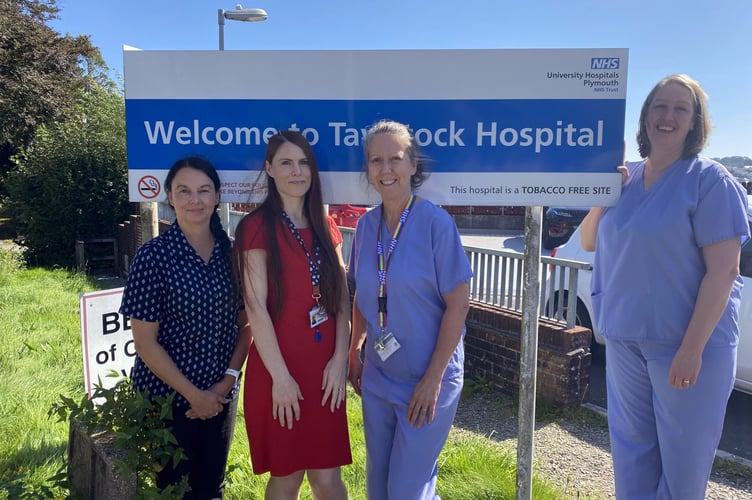Tavistock Hospital is an under-recognised and underused health resource close to home for many people used to going to Plymouth or Exeter for treatment, writes Guy Boswell.
The Times is going behind the scenes in the coming months at this hospital on our doorstep to shed some light on the care all of us can receive from the most caring and qualified people in the NHS.
Behind the red brick facade of the modest hospital is Tracey Atkin, senior theatre sister and outpatient manager for the hospital and nearby Tavistock Clinic.
She said: “There are a lot of people in Tavistock who don’t know much about us. They certainly don’t know most of that we do here. And some don’t even know where we are. Not surprisingly most patients think they have to go to Derriford for even minor procedures, but we have an operating theatre, which would come as news to many. We benefit from being part of Plymouth Hospitals Trust NHS services using the same consultant surgeons, anaesthetists and their juniors to perform surgery on our patients here as they do in Derriford, so we get the best of the best here.
‘So, if people are nervous about coming to Tavistock Hospital for a procedure, then don’t be. On the contrary, just because we are not Derriford doesn’t mean we don't have the best staff available, we certainly do. I know local people would rather not go to Derriford if they don’t have to. They’d prefer to be admitted close to home and that’s what we do. It’s less stressful. Also, our patients see the same staff through their pre-surgery assessment, during and after their surgery, which is very reassuring and comforting.
“We are also able to be very efficient with our time and when patients come in for surgery, we get them home or back to care homes on the same day. So, if people come in the morning, we can discharge them by the afternoon and if they come in the afternoon, we can usually get them home by about 6pm. Because of the latest anaesthetic patients don’t have to spend many hours in bed recovering. Many people assume they do have to stay in bed for a long period following surgery, but this is not the case, ‘home is the best place to recover’ following day case surgery. They do procedures under general anaesthetic where you are asleep and local anaesthetic, where the area is numbed.
“Patients receive further reassurance, even when they are sent home from a system called PROMS which is an online survey and gives surgeons and staff a good picture of how patients are responding to procedures. However, older people who do not have access to online surveys are contacted by staff by telephone. It’s also reassuring to patients, letting them know we are thinking of them even when they’re at home.
“There is room and personnel available for Tavistock Hospital to expand the number of patients and services if needed. With the hospital able to carry out surgery from different ‘day case’ specialities that Derriford need the teams to do. They provided many different surgical specialities, which can change dependant on the need of the waiting lists. Our aim is to provide services and support for patients and help reduce pressure on our very busy Derriford Hospital. This is one of the reasons we have set up our new plastic dressing clinic.”
The outpatient services are based at the hospital and in Tavistock Clinic, offering surgical and medical consultations, nurse-led clinics, clinics with non-NHS providers and community healthcare clinics. Theatre staff also support outpatient services, giving them invaluable experience and patients extra assurance when they see familiar faces caring for them. X-rays are provided for patients attending minor injuries unit (MIU) or GP requests or consultant requests in clinic.
The hospital also has a 15-bed medical ward which admits patients from Plymouth and Exeter Hospitals as well as the community and supports end of life care. Patients may need rehabilitation and support before being discharged home or to a care home. At Tavistock Hospital there is a small and very experienced team of physiotherapists providing an adult musculoskeletal physiotherapy service which people can self-referral online or on a paper form collected at reception. Referrals can also be made through the GP, or after surgery through the consultant or team managing the care.
The hospital offers therapy for injuries following broken bones, as well as more long-standing pain conditions and osteoarthritis. We also offer paediatric physiotherapy for simple musculoskeletal conditions which can be referred via your GP. The MIU provides urgent care for non-life threatening issues and is open from 8.30am to 5.30pm, seven days a week, staffed by experienced nurse practitioners and heathcare assistants.
Tracey added: “Backing all this up is the administration team which provides the first faces you see when you come to the front desk. They are multi-skilled and can cover a range of services for various health teams and disciplines. They support theatre, X-ray, wards and outpatients. We are all one big team.’’



